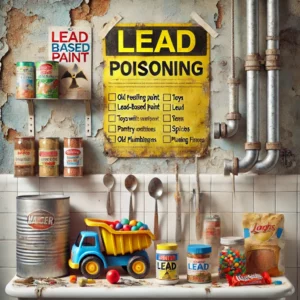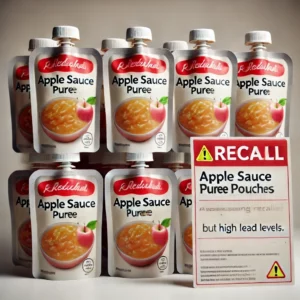The Hidden Danger in Your Kitchen: Polymer Fume Fever
Nonstick cookware has become a staple in many kitchens due to its convenience and easy cleaning. However, recent reports have shed light on a health issue, Teflon Flu, linked to these popular kitchen items. This article explores the causes, symptoms, and prevalence of this condition and safety measures to prevent it.
5 Key Points
- Teflon Flu, or polymer fume fever, is caused by inhaling fumes from overheated nonstick cookware
- Reported cases of suspected polymer fume fever nearly tripled from 2018 to 2023
- Symptoms resemble the Flu and typically last 1-2 days
- Proper use of nonstick cookware, including temperature control, can prevent Teflon Flu
- The condition can affect both humans and pets, with birds being particularly susceptible
Understanding Teflon Flu
Teflon Flu, known as polymer fume fever, is caused by inhaling fumes from overheated polytetrafluoroethylene (PTFE)-coated products, commonly found in nonstick cookware. Dr. Kait Brown, clinical managing director at America’s Poison Centers, explains, “Teflon flu is a specific type of polymer fume fever. It’s a flu-like illness from breathing in fumes from polytetrafluoroethylene (Teflon) that has been heated beyond its recommended maximum temperature.”
According to the National Institutes of Health (NIH), the polymer coating that makes these pans nonstick can release toxic gases and chemicals at high temperatures. This release of fumes leads to the symptoms associated with Teflon Flu.
Rising Incidence of Teflon Flu
Data from America’s Poison Centers reveals a concerning trend in the number of reported cases of suspected polymer fume fever:
Year’s – Case Count
2018 – 99
2019 – 79
2020 – 103
2021 – 113
2022 – 191
2023 – 267
While these numbers represent a small portion of the population, experts believe the true incidence may be higher. Melissa Dibble, a spokesperson at the Centers for Disease Control and Prevention, notes, “A lot of the symptoms can resemble other illness like influenza and other viral infections, people might not realize that their symptoms are linked to their cookware.”
Recognizing the Symptoms
Teflon Flu presents with a range of flu-like symptoms. According to the Poison Control, these may include:
- Headache
- Fever or elevated temperature
- Shivering or chills
- Muscle aches or cramps
- Weakness
- Coughing
- Thirst
- Nausea
- Sweating
- Bad or unpleasant taste
Dr. Brown adds that these symptoms typically last one to two days. The similarity to common flu symptoms may lead to underreporting or misdiagnosis of Teflon Flu cases.
Preventing Teflon Flu
To minimize the risk of Teflon Flu, experts recommend following these guidelines:
- Adhere to the recommended maximum temperatures for nonstick cookware.
- Avoid leaving empty Teflon pans on high heat.
- Do not use nonstick cookware in ovens hotter than 500 degrees Fahrenheit.
- Use a kitchen exhaust fan while cooking when possible.
- Replace old or damaged nonstick cookware regularly.
Case Study: The Dangers of Overheated Cookware
A 2012 NIH case report details the experience of a 29-year-old Japanese man who developed Teflon Flu symptoms after accidentally overheating a PTFE-coated pan. The man fell asleep while boiling water for pasta, waking up five hours later to find white smoke in his kitchen. After extinguishing the fire and running water over the burned pan, he inhaled the resulting explosive vapor.
The man experienced fatigue, coughing, and difficulty breathing several hours later. Medical staff diagnosed him with polymer fume fever based on his symptoms and the circumstances. After treatment with oxygen inhalation and observation, his symptoms improved significantly within a day and were entirely resolved by the third day.
This case highlights the potential severity of Teflon Flu and the importance of proper cookware use and ventilation in the kitchen.
Implications for Pet Owners
It’s crucial to note that Teflon Flu doesn’t just affect humans. Dibble warns, “Fumes released when PTFE is heated to high temperatures can harm animals such as pets. Animals with fragile respiratory systems like birds tend to be more susceptible to these fumes.” Pet owners should be particularly cautious when using nonstick cookware, especially if birds are in their homes.
FAQ
Q: What exactly causes Teflon Flu?
A: Teflon Flu is caused by inhaling fumes released when polytetrafluoroethylene (PTFE)-coated products, commonly found in nonstick cookware, are heated beyond their recommended maximum temperature.
Q: How long do Teflon Flu symptoms typically last?
A: Symptoms of Teflon Flu usually last between one to two days, according to experts.
Q: Can Teflon Flu be dangerous to pets?
A: The fumes that cause Teflon Flu can harm pets, especially birds and other animals with fragile respiratory systems.
Q: How can I prevent getting Teflon Flu?
A: To prevent Teflon Flu, follow the recommended maximum temperatures for your cookware, avoid leaving empty pans on high heat, use kitchen exhaust fans while cooking, and replace old or damaged nonstick cookware.
Q: Are all nonstick pans dangerous?
A: Not when used correctly. Nonstick pans are safe when used at recommended temperatures and replaced regularly. However, overheating or using damaged pans can pose risks.
Citations
Forbes, A. (2024, August 10). What is Teflon Flu? Learn about the illness linked to nonstick cookware. USA TODAY. https://www.msn.com/en-us/health/other/what-is-teflon-flu-learn-about-the-illness-linked-to-nonstick-cookware/ar-AA1oyNwE







